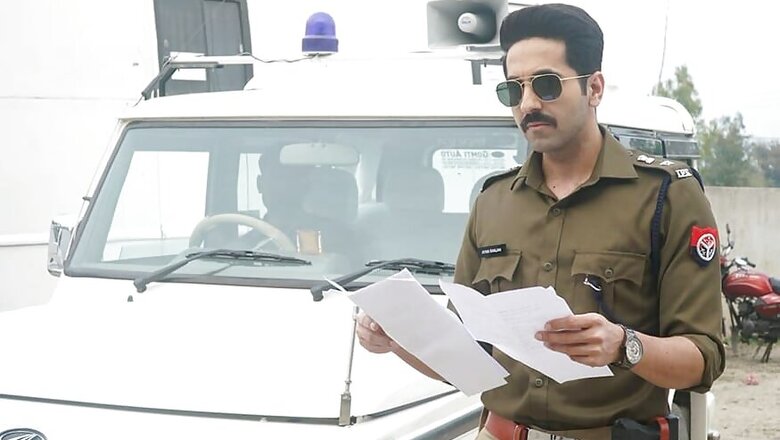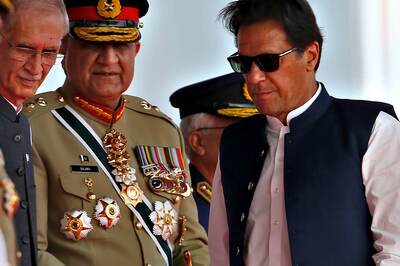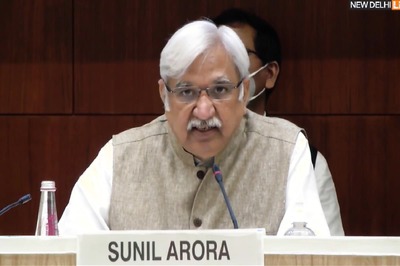
views
Article 15
Director: Anubhav Sinha
Cast: Ayushmann Khurrana, Kumud Sharma, Manoj Pahwa, Sayani Gupta, Mohammed Zeeshan Ayyub, and M Nasser
Article 15, is a modern fable based on or inspired by the provision in the Indian constitution, that assures every citizen that there shall be no discrimination on the basis of caste, creed, gender or any such. The film comes complete with a lesson at the end - not the heavy-handed sorts that we are so accustomed to, but just a genteel reprimand on the folly of our ways.
Ayan Ranjan (Ayushmann Khurrana) an IPS officer finds himself posted at Laalgaon, in the boondocks of Uttar Pradesh. In the opening scene of the film, we first see a motley group of the unwashed masses, the children of the lesser God singing a ditty. This intercuts with Ayan ensconced comfortably in a car with the signature Laal Batti hurtling across the new highways crisscrossing the countryside. He is on the phone with his wife exchanging messages about the unpolluted air. Ayan, within the confines of his car, seems almost oblivious to the world outside that awaits him. The director masterfully builds up the suspense, dropping crumbs (intercutting scenes) that point to the fact that something is about to open the floodgates to reality.
On the way, his driver points to a village and tells him a story from the local lore that when Lord Ram returned from his exile, the village had remained in darkness while the city of Ayodhya and all other surrounding villages were lit up. Lord Ram himself noticed the darkness and asked for the reason why the village had not lit lamps. The villagers replied that they had done so but a gale had put out the lights. And awash with darkness the village folks noticed that the King’s palace in Ayodhya shone even brighter in the surrounding darkness and so they opted for blackness! The story is obviously an oblique reference to those accustomed to sacrificing their own comfort and identity in the service of the more powerful.
As Ayan settles in, he soon realizes that everything is not as it seems. Early on in the film, he gets introduced to small town rules of engagement with the caste system. We see him being advised against buying water from a shop as the shopkeeper belongs to a certain caste. His subordinates especially Brahmadutt (Manoj Pahwa) go to great lengths to not get him too involved in local matters, lest it disrupts the status-quo or the existing arrangement. Meanwhile, three girls go missing and despite complaints, none of the cops seem interested in investigating matters, until Khurrana gets into the act.
In this tale of prejudice, crime, and humanity, Sinha and co-writer Gaurav Solanki do well in keeping it simple. There is a controlled elegance to their writing which is both charming and sharp. The dramatic tone is subdued, never getting out of hand, allowing the oppressiveness of the caste system to get established through characters and anecdotes. Ewan Mulligan’s cinematography and the background score help add an unpredictable and ominous element, lending it hyperrealism so essential to such sagas.
Article 15 is remarkable in that it does not pontificate. It merely holds up the mirror to a society still entangled in age-old caste politics that absolutely overrides the modern ideals of liberty and equality. After Masaan, Article 15 is that rare film which articulates the existential angst of the ‘Others’- the unprivileged castes in contemporary India.
Stellar supporting performances by the ensemble of Kumud Sharma, Manoj Pahwa, Sayani Gupta, Mohammed Zeeshan Ayyub, and M Nasser pack the necessary punch. Leading man Ayushmann Khurrana’s performance is refined. Channeling his inner white rage for the role, Khurrana’s interpretation of a cop is very different from the verbose, double-barrel dialogue delivering cops that often populate our films. This one is no alpha male, but a sensitive one who wants to set things right, the right way. And Khurrana plays it with understated elegance and precision that makes Ayan, both likable and effective.
Director Anubhav Sinha who has to his credit entertainers like Tum Bin, Dus and Ra.One has certainly found his groove with movies that qualify as social-issue-based commercial films. He combines elements of popular film-making with realistic story-telling and the result is an outstanding film. Mulk, which released last year made everyone sit up and take note of his work more seriously. With Article 15, Sinha compels us to ask for an encore.
Rating: 4/5
Follow @News18Movies for more




















Comments
0 comment